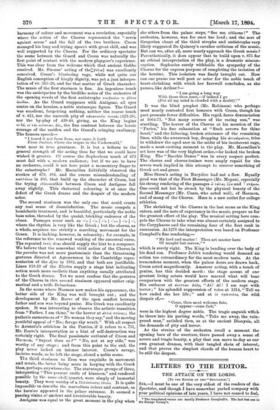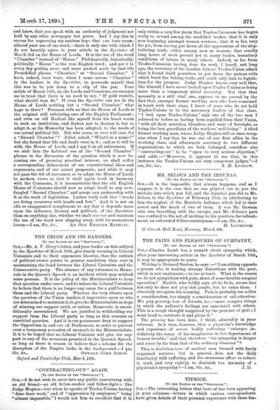LETTERS TO THE EDITOR.
THE ATTACK ON THE LORDS.
[To THR EDITOR OP TER " SPECTATOR:'] must be one of the very oldest of the readers of the- Spectator, and though I have somewhat parted company with your political opinions of late years, I have not ceased to feel,
• The translated verses are mostly Professor Campbell's The last bat one is Sir George Young's.
and know, that you speak with an authority of judgment not held by any other newspaper but yours. And I say this in -excuse for expressing my anxious hope that Sou have recon- sidered your use of one word,—there is only one with which I do not heartily agree in your article in the Spectator of March 3rd on the House of Lords. It is the use of the word " Chamber " instead of " House." Philologically, historically, politically, " House" is the true English word ; and yet it is -every day getting more and more pushed aside by that vile Frenchified phrase, "Chamber," er "Second Chamber." I 'have, indeed, been wont, when I came across " Chamber " in the leaders in the Spectator, to persuade myself that this was to be put down to a slip of the pen. Your article of March 10th, on the Lords and Commons, encourages me to trust that there is no need to say, " If gold rusteth, what should iron do." If even the Spectator can see in the House of Lords nothing but a "Second Chamber," what hope is there P Freeman tells us that the House of Lords is the original still subsisting core of the English Parliament ; and even an old Radical like myself feels his heart warm to such an institution, and desires not to destroy it, but to adapt it, as the Monarchy has been adapted, to the needs of our actual political life. But who cares, or ever will care, for a "Second Chamber "P Juliet asked, " What's in a name P" but she found that life and death were in it ; and so it will be with the House of Lords, and I say it in all seriousness. If we sink into the habitual use of the "Second Chamber" phrase in the discussion of the question which is now be- coming one of pressing practical interest, we shall suffer a corresponding debasement of our constitutional ideas and -arguments, and of our actual proposals ; and while it may -not pass the wit of statesmen so to adapt the House of Lords to modern views as that it shall again work in harmony -with the Commons, it is inconceivable that the old English House of Commons should now so adapt itself to any new- fangled "Second Chamber," and accept any partnership with it in the work of legislation. Luther truly said that " words are living creatures with hands and feet." And it is not an .idle or exaggerated compliment to say that it depends more -upon the influence, literary and political, of the Spectator, than on anything else, whether we shall recover and maintain the use of the word now slipping away, with its momentous
issues.—I am, Sir, Sze., AN OLD ENGLISH RADICAL.



































 Previous page
Previous page